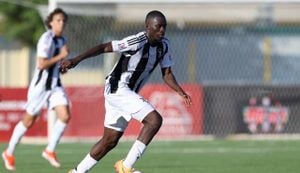Pope Francis remains hospitalized with pneumonia affecting both lungs, leading to heightened concerns over his health due to his advanced age and previous medical issues. According to Dr. Sergio Alfieri, one of the attending physicians, during a press conference at the Gemelli Hospital in Rome, the Pope is not yet "out of danger" and will remain under care for at least the upcoming week.
The pontiff, who has been receiving treatment since February 14, initially admitted for bronchitis, experienced complications resulting in pneumonia. This serious infection exposes him to significant health risks, especially at the age of 88 and considering he has previously lost lung capacity due to tuberculosis at 21.
On Saturday, February 22, Vatican communications provided updates confirming the Pope's restfulness but reiterated the seriousness of his condition. "The Pope is not out of danger? No, the Pope is not out of danger," Dr. Alfieri stated, emphasizing the potential risks associated with his illness, including septicemia due to localized respiratory germs. He noted, "The real risk is... germs passing to the blood, potentially causing septicemia." This level of caution reflects the gravity of Francis's situation, as well as the health challenges he has faced over the years.
Despite the seriousness of his hospitalization, Pope Francis has remained active within the confined environment of the hospital, meeting with close aides, reviewing documents, and making phone calls. The Vatican reported, "The Pope has been resting well," indicating some positive aspects amid the concerning backdrop of his health.
The prolonged hospitalization—now the fourth since 2021—has provoked discussions about whether the Pope can continue fulfilling his papal duties. Previous health alerts involving mobility challenges and respiratory issues contribute to growing anxiety among the Catholic community and the global public. Rallying behind the Pope, messages of support flooded in from political and religious leaders worldwide, signaling the esteem and affection held for the pontiff.
With reports of the Pope's health drawing speculation about possible resignation, Cardinal Pietro Parolin, Secretary of State for the Vatican, noted, "I have the impression these are useless speculations." Meanwhile, Cardinal Jean-Marc Aveline remarked on the Pope's autonomy, stating, "He is free... if he thinks it's the best for the Church, he'll do it." The prospect of resignation has been treated delicately within Church dialogue, underscoring Francis's previously stated awareness of his health and pastoral obligations.
Further complicate matters, recent social media outbreaks of misinformation falsely reporting the Pope's death have exacerbated concerns, prompting the Vatican to be careful about communication, particularly related to his schedule and potential public appearances.
The Pope’s health complications have raised broader questions about leadership at the Vatican and the potential for succession. Observers note the unprecedented nature of Francis's papacy being characterized by reforms and internal challenges, setting the stage for potential discussions on the future of the Catholic Church.
This complex scenario continues to develop, underpinning the delicate balance of health, leadership, and the Church’s direction amid unprecedented challenges. The coming week will be telling, as hospital authorities assess the Pope’s recovery and readiness to perform his duties, including whether he can preside over the upcoming Sunday Angelus prayer—a traditional event taking place from his hospital room if necessary.



